One day match on a rainy day invites attention
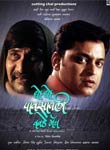 |
Rating: na
Presentor: Cutting Chai Entertainment Director: Nitin Kamble Producer: Vinayak Karanjkar Story, Dialogues, Screenplay: Swapnil, Janmejay Cinematographer: Aniket K Music: Rajesh Sawant Cast: Suhas Palshikar, Vijay Chavan, Shekhar Phadke, Priyanka Yadav, Madhavi Juvekar, Ravindra Berde, Bhushan Ghadi, Shivani Karadkar, Kamlesh Sawant Movie Review by: Ulhas Shirke |
Rain always plays spoilsport during a one day cricket match. But, in the new Marathi film titled ‘Dho Dho Pavsatli One day Match’ (D2PODM) the running commentary of the one day match inspires the two main characters to find solution to their problems. Two strangers Vinay Upadhye (Suhas Palshikar) a pensioner and Shekhar Sarpotdar (Shekhar Phadke) – A software Engineer, meet each other by coincidence at a tea stall on a rainy evening and get stranded for 2 and a half hours due to non stop rains. They share their experiences on the backdrop of the one day match commentary going on the radio and also witness the lifestyle of some of the visitors, who pay a visit to this stall during this period.
Director Nitin Kamble has used his creativity to present this sensitive subject while showing the contrast between two generations and passing a social message of understanding true human relations. No wonder, he has cleverly presented the clean image of master blaster Sachin Tendulkar, to connect with his screenplay. Every happening that takes place at the tea stall has some relevance to the main theme of existing human relations and the changes that have taken place with the passage of time.
The theme of the film being an universal subject, the film is likely to appeal international audience and the art film lovers scattered all over India. Looking at the title of the film, one expected this film to be an action packed thriller, but it has turned out to be a simple neat and clean sensible film. With the conclusion of cricket match, with India with the help of Sachin scoring that winning stroke in the last over; the film too ends well with a solution.
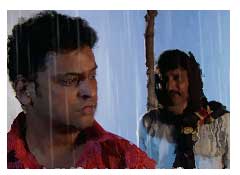
Suhas Palshikar as a pensioner does very well in that emotion filled character, who feels lonely at home with his son who is a busy surgeon and daughter-in-law who insists on his joining the home for aged. On the other side, Shekhar Phadke as Shekhar Phadke, Suhas Palshikar
Software Engineer presents a perfect image of today’s youngster from an affluent family, who gets fed up with the daily arguments between his father an IAS officer and mother a college Principal (played by Dr. Vilas Ujawane and Shubhangi Latkar) .
The character played by Vijay Chavan who takes to excessive drinking after the death of his wife plays an effective communicator between Vinay and their common friend who suffers in his own house. Priyanka Yadav who plays the role of Manasi-the girl Shekhar falls in love at first sight, does her job well. Few other artistes in the supporting role including the Tea stall owner and the little boy working in that tea stall are impressive. D2PODM is a well made film for those who love to watch technically well presented artistic films.
‘Mani Mangalsutra’ defines Man and Woman relationship
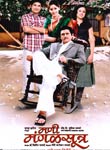 |
Rating: na
Presenter: Big Cinemas Producer: Dr. Dilip Sarwate Director: Gauri Karekar Sarwate Script, Screenplay, Dialogues: Madhvi Kunte, Gauri KarekarSarwate Camera: Saleel Sahastrabuddhe Music: Awadhoot Gupte Cast: Hrishita Bhatt, Ravindra Mankani, Anjali Kusre, Umesh Kamat, Lalan Sarang, Ashalata Wabgoakar, Vandana Gupte, Madhurani Gokhale, Seema Deshmukh, Madhav Abhyankar, Omkar Karve, Late Vihang Nayak Movie Review by: Ulhas Shirke |
Marathi films are going global. And, who says that our Indian films are short of good subjects? Here is our own Marathi film ‘Mani Mangalsutra’ based on an original true story written by Late Advocate Supriya Sarwate , which goes on to define the perfect man and woman relationship, which is more out of affection and caring for each other rather than just limiting it to sexual relationship. Young Film maker Gauri Karekar Sarwate was so much inspired by this unusual story written by her late mother-in-law, that she decided to make a film on this true story.
The film opens up with the leading lady of the film Savitri (Hrishita Bhatt) in her 50 plus welcoming young Shantanu (Umesh Kamat ) and his girl friend Swati (Anjali Kusre) at her house. The boy has lived in her neighborhood for a long time since his childhood and has come to see her after completing his higher education. He is so much impressed with the successful live in relationship of Savitri with the school master (Ravindra Mankani) for 30 long years that he tries to convince his girlfriend to begin their life in the same manner. The girl, though modern and London returned however does not agree to his views and suggests him that marriage should be supported by legality. That’s where the conflict begins. In the meanwhile, a case stands up against Savitri, after her husband’s death to vacate her house, as she has no legal documents to prove her relationship
Very cleverly the director has presented these two relationships of two different generations and their fight for recognition in the society. Actually, the film debates on the sanctity of marriage. Are the black beads around your neck enough to indicate your true love relationship? At the same time the film goes on to show, how difficult it is for a woman to live such a life, without wearing a Mangalsutra. The film also highlights the most important aspect of Maharashtrian culture, through its well presented screenplay.
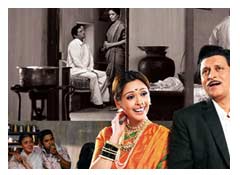
While showing the childhood of Savitri in the flashback, the director has shot that part in black and white, including one wonderful song that reminds us of Prabaht films during the olden days. Paying more attention on rituals like Mangalagauri, a beautiful song rendered by Shreya Ghoshal only goes on to add that special flavour to this technically well presented film. Every character in this film has a special place, be it witty Joshi Kaku played by Vandana Gupte or Savitri’s friend Gauri played by Madhurani Gokhale Prabhulkar. The young couple played by Umesh Kamat and Anjali Kusre make a perfect match for each other. And how can you forget those veterans like Ashalata Wabgaonkar and Lalan Sarang? They all have supported well in the cast. Especially Savitri’s interaction with her friend Gauri and her encounter with Joshi kaku have been shot well.
Hrishita, in particular has given her best performance in the role of Savitri. Watch her sharp expressive eyes emoting at every important sequence and you feel that she certainly deserves an award for her brilliant performance on debut in a Marathi film. She has worked very hard to dub in her own voice. Ravindra Mankani as a school master has also done exceptionally well. In one particular scene where he confesses his own weakness before Savitri, both of them have displayed their emotions very naturally. Seema Deshmukh, Madhav Abhyankar and Omkar Karve have given their best in supporting roles. Avadhoot Gupte’s music is impressive and so is late Debu Deodhar’s photography. ‘Mani Mangalsutra’ does have an international appeal and should catch up with the audience with the word of mouth praise. It is certainly a technically well presented film.
‘Agadbam’ is the kind of film that speaks about the change that Marathi film industry
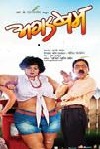 |
Rating: na
Presenter: R. K. Entertaiment Producer: Trupti Bhoir Direction: Satish Motiling Story: Abhijeet Joshi Camera: Satish Motling Music: Ajeet And Sameer Cast: Makrand Anaspure, Trupti Bhoir, Usha Nadkarni, Chitra Navathe, Vikas Samudre, Narayan Jadhav, Tejaswee Patil, Mahesh Kokate, Mangesh Satpute Movie Review by: Namita Majgankar |
At a time when obesity is on the rise in our country, Trupti Bhoir comes up with a unique theme through her latest film ‘Agadbam’. Aptly titled, the film talks about the strange happenings in the life of an obese girl Najuka weighing 250 kgs with a huge structure. Najuka’s father has fixed her marriage while she was a child to his friend’s son and it’s a commitment given to a priest in the temple of Lord Lingoba.
When the communication is reached between the two parties after so many years reminding each other about the promise, the stage is set to get Najuka married to late Devkule’s son Raiba, who is not allowed to see the bride, as per the tradition. Raiba, who is otherwise desperate to get married, agrees to marry Najuka with this condition. But, when he finds Najuka in her real shape, he starts hating her. Though Najuka wins the heart of her Mother-in-law and Grand Mother-in-law; with her good nature; she fails to win over her husband.
The film’s screenplay makes you a part of their family friends developing sympathy towards Najuka. When Najuka leaves her husband’s place; Raiba realizes his mistake as he is made to understand by people around him, explaining the meaning of a good ideal wife. Finally everything ends well with a happy note.
‘Agadbam’ is the kind of film that speaks about the change that Marathi film industry has brought in technical areas. Watch the Prosthetic make-up of Trupti Bhoir in that role of Najuka and you will be stunned. The usage of VFX and DI makes the film perfect in presentation. Cinematographer and director Satish Motling has used his expertise to present the film, keeping in mind the plus points of Najuka’s character. Makarand Anaspure, Trupti Bhoir, Usha Nadkarni
Trupti has dared to present herself in that get-up throughout the film, except for two songs in dream sequence , where she appears normal.
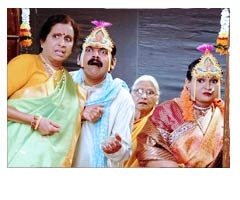
Dialogues of the film have been written by Mangesh Kulkarni, keeping in mind the mixture of village and city lifestyle. Few dialogues to impress upon the financing institution like IDBI bank were uncalled for, but they have been used to make their media partners happy. The screenplay of the film is otherwise well presented, with good editing work. You will never feel bored throughout the film. Makarand Anaspure as Raiba and Usha Nadkarni as his mother fit in perfectly into their respective roles. Trupti has played her character perfectly, to derive sympathy from the audience. She has paid more attention on her body language, especially her walking style and her voice. Music of the film is good, with two meaningful songs and one dhamaal song inviting the attention.
In all, ‘Agadbam’ is a well presented entertaining film, with a message. The film is sure to invite the attention of viewers, even other than Maharashtrians; for its novel theme. It will not be surprising, if the film maker receives offers for a remake in other languages.
‘Laadi Godi’ only mocks Bollywood
|
Rating: na
Presenter: Uttara Food and Feeds Pvt. Ltd. Producer: Bala Entertainments Story, Screenplay, Lyrics, Direction: Mahesh Tilekar Camera: Debu Deodhar Dialogues: Mukund Taksaale Music: Kamlesh Bhadkamkar Cast: Tushar Dalvi, Varsha Usgaonkar, Bharat jadhav, Dipali Sayyed, Aniket Vishwasrao, Smita Shewale, Subodh Bhave, Resham Tipnis, Sanjay Narvekar, Krani Redkar…. Movie Review by: Ulhas Shirke |
It looks like that our Marathi film makers are devoid of good scripts. In the name of comedy, today they are offering anything that is available ready made. As it is, over the years our Bollywood has offered them so much to imitate in Marathi that the search becomes much easier. Director Mahesh Tilekar’s latest film ‘Laadi Godi’ is one such experiment where you will find lots of popular Marathi artistes together to mock the styles of Bollywood personalities like Amitabh Bachchan, Dharmendra,Jitendra, Hema Malini, Sridevi, Rekha, Anil Kapoor, Madhuri, Rajesh Khanna and Sharmila Tagore. Oh, sorry! The list is not over. There is Govinda and Karishma too.
So, using the names of these stars in the respective characters in this film, our Marathi stars comprising of Tushar Dalvi, Sanjay Narvekar, Subodh Bhave, Kranti Redkar, Resham Tipnis, Varsha Usgaonkar, Aniket Vishwasrao, Smita Shewale, Bharat Jadhav, Deepali Syed , Vijay Chavan and Kishori Ambiye have tried their best to mock them. In addition to that Shweta Shinde plays an abrupt role of an auto rickshaw driver just for two scenes. Now, if you try to measure the length of their roles, it will be noticed that they are all on a picnic at a guest house.
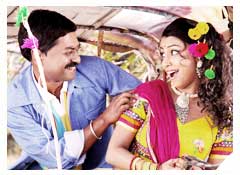
Now, to say something about the film’s story, Just as our three heroines – Rekha, Hema and Sridevi hate men the three heroes played by Amit, Daharmendra and Jitendra hate women. The main hero of the film Rajesh keeps on making frequent appearances in between the screenplay in different forms, begging before the three women to vacate his bunglow, as his newly wedded wife Sharmila would only then agree to celebrate their honeymoon there. One wonders, as to why he couldn’t celebrate his honeymoon elsewhere? But, then how would the film progress further? So, Rajesh seeks help from the trio comprising of Amit, Dharmendra and Jitendra to drive away these three women from his bungalow. He accommodates them on the Ground floor.
In comes Anil( Aniket) , who has been brought up by the three men in absence of his father and also Madhuri ( Smita Shewale) who has grown up in the shelter of the three women in absence of her mother. While Anil- Madhuri fall in love with each other, in spite of the opposition of their uncles and aunties; the two attendants of the bungalow- Govinda and karishma also fall for each other in a filmi style . Obviously, watching these two couples, the tenants find each other’s match. And with that we see happy ending of the film.
Such a kind of comedy, where every star tries to mock a bollywood personality suits well in a mimicry item on the stage in a reality show or even to that extent in a stage play, where they are provided the liberty to perform the way they want. But, the same experiment may not necessarily work in a cinema. In Maharashtra, we have different type of audience for drama and movie. The taste differs, as the presentation forms are different. There are few exceptions, where the scripts of both a drama or a movie are based on a real story or suspense filled fiction. However, in the case of ‘Laadi Godi’ it is only mockery of Bollywood, without any specific purpose. So, just by naming the characters with these popular Bollywood personalities, failed to invite the attention of all. The presentation has to be very perfect to create that spontaneous laughter. And frankly speaking, that does not happen in ‘Laadi Godi’.
The biggest flaw in the screenplay is that the sequences haven’t been properly placed in the order. When Anil walks in the house with gifts for his uncles, he presents Jitendra a pair of white shoes, which he is shown wearing in a previous scene. Sanjay Narvekar plays the scene of ‘Sholay’ in a typical Dharmendra style climbing on the top of the water tank, addressing the villagers; but there are no villagers around. There is only Hema. One can understand that while watching such films in a theatre , you have to leave your logical thinking process behind; but, that does not mean that the film maker should taste the patience of the audience. ‘Laadi Godi’ has thus turned out to be just another ordinary marathi film, certainly not for multiplex audience. Late Debu Deodhar, however leaves his mark as a cinematographer; as this is the last film he did before his untimely death. So, is the case with Nilu Phule, who makes a guest appearance in this film.
‘Paaradh’ highlights the socio – political issue
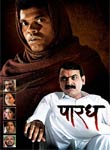 |
Rating: na
Presenter: Amogh Cinetones Producer: Anuradha Talati Director: Gajendra Ahire Story: Gajendra Ahire Camera: Chandrashekar Iyer Music: Rahul Ranade Cast: Siddharth Jadhav, Makarand Anaspure, Hemangi Kavi Dhumal, Ravi Kale, Vrinda Gajendra, Vinay Apte, Amogh Talathi, Vitthal Umap, Milind Shinde Movie Review by: Ulhas Shirke |
Marathi films are back on the traditional track with tales of exploitation of rural poor. Only difference that we find now is the change of characters. The place of shrewd Zamindar or Village Sarpanch has been taken by selfish politicians, who are in search of youngsters to dance on their tunes to meet their personal goals. Gajendra Ahire’s latest film ‘Paaradh’ is no different from all those traditional Marathi films, but it sends out a strong message to today’s directionless youth; who are blindly following their leaders. Through this film, the maverick film maker makes a clear point of exploitation of rural youth by a power hungry politician, who uses them for his political gains and later sidelines them only to be killed by his opponents.
Ambadas (Makarand Anaspure) and his right hand Bappa( Milind Shinde) are involved in all such unethical practices at District level to prove their strength. They don’t miss a single opportunity to blackmail their own party seniors and one such victim is Prataprao(Vinay Apte). They first capture the dairy co-operative business with the help of young jobless youths from the village. Ambadas does not stop here, as his political ambitions are much higher. He dares to challenge even his party chief- Appa (identity not revealed) by exposing him with his wrong deeds with the help of his most trusted party worker Yashwant ( Siddharth Jadhav), whom he calls ‘Wagh (Tiger)’.
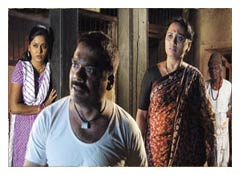
Yashwant-a small time party worker, who blindly follows the orders of his boss, suddenly comes into limelight. It is at this time Ambadas ditches him. His right hand Bappa, knowing the weaknesses of his boss, plays all dirty games in his name and even lures Yashwant’s younger sister Indu (Hemangi Kavi Dhumal) . Yashwant who belongs to a Warkari family, is the most notorious character in the family, who neither obeys his old father( Vitthal Omap) nor elder brother(Ravi Kale), who is a farmer.
Yashwant’s younger brother Anand (Amogh Talathi) , who is the mute witness to all the events the family faces, is actually the narrator in the film. The entire film is based on the political gimmicks of Ambadas and his link with Yashwant and his family. Finally, it is not only Yashwant who suffers, but his family members too. In the end of the film, Anand as a narrator tells that Siddharth who is undergoing sentence for the murder of Amabadas and Bappa, has one more year left for release and that his elder brother who had gone in search for justice is still missing. His sister-in-law(Vrinda Gajendra) works in the field and his ambitious sister Indu heads the women’s wing of the district. Finally, he concludes saying that he himself is well settled in a district place with his job and his son studying in a good Public school.
‘Paaradh’ begins well with realistic approach but drags in the second half with too many chase scenes, where Yashwant runs for his life, having been ditched by Ambadas. The characters of Ambadas, Yashwant, his elder brother ,his sister-in-law and sister Indu look realistic. The person who invites the attention is Milind Shinde in the role of Bappa. With his perfect visual expressions and body language, he has been able to present a real villain of Marathi films. Vinay Apte has been wasted in that role of Politician. There is no strength in his role, though he plays it with ease. Can’t find the reason for hiding the identity of Party chief. But, looking at the performances from Siddharth Jadhav, Makarand Anaspure, Hemangi Kavi Dhumal, Ravi Kale and Vrinda Gajendra, you tend to forget those few flaws in the film. Camera work by Chandrashekhar Iyer, Background music by Rahul Ranade and editing work by Rahul Bhatankar is pleasing.
‘Tee Ratra’ – A Well presented Psycho-Thriller!
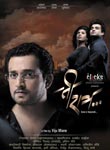 |
Rating: na
Presenter: It Clicks Productions Director: Viju Mane Story: Hemant Edlabadkar Camera: Shabbir Naik Music: Vinay Rajwade, Pravin More Cast: Prasad Oak, Santosh Juvekar, Aditi Sarangdhar Movie Review by: Sandeep Hattangadi |
Marathi cinema doesn’t have a tradition of whodunits and thrillers, but in the recent past Marathi cinema has given us many good thrillers like ‘Ranbhool’, ‘Checkmate’ & ‘Ringa Ringa’. Director Viju Mane’s ‘Tee Ratra’ is a welcome addition to this genre. The film starts off with an easygoing pace, with a newly married couple checking into their honeymoon suite. However, their conjugal night begins with a chilling chain of sequences, which keeps the viewers glued to their seats.
The couple played by Santosh Juvekar and Aditi Sarangdhar are very much in love, but Santosh has doubts about his wife’s fidelity and tries to find the other man in her life by installing web cameras in their desolate bungalow and also hires the services of a psychiatrist played by Prasad Oak, who is his childhood friend.Prasad uses various psychiatric tools like putting Aditi to extreme emotional trauma by posing as a serial killer and puts her through hypnosis to bring her sub -conscious to the fore.
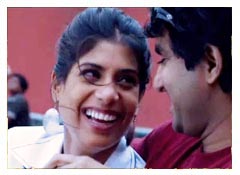
Finally, the treatment works and Aditi blurts out her innermost secret. What is that secret? Well, that’s the suspense . Director Mane has kept the proceedings fairly brisk and has been inspired by many films like ‘Dial M for Murder’, ‘Vertigo’, ‘Gaslight’, ‘To Chase A Crooked Shadow’, ‘Grand Larceny’, ‘Postman Always Rings Twice’ and closer to Bollywood’s ‘Shaque’ besides the dark noir plots of James Hadley Chase novels.
The film can only boast of some excellent performances, especially by Prasad Oak, who gives one of his best performances as a shrink turned serial killer. Santosh Juvekar is rightly restrained as the caring husband. Aditi Sarangdhar as a disturbed wife, gives a good account of herself. Subodh Bhave’s role as Santosh’s partner and that of Mangesh Desai’s are half baked .Most of the film has been shot indoors in a bungalow, a la RGV style which reminds one of his films ‘Kaun’ and ‘Raat’ and the Hollywood classic ‘Halloween’.
Shabbir Naik has shot the film in natural light without any fancy angles, which any other DOP could have gone overboard with. The songs are okay but the background music is more effective and gives goose bumps sometimes. The editing is superb and the director has used many cinematic ‘jerks’ to startle the audience, which is expected from any good thriller.
However, the film is not totally flawless. Can a five year old girl have a sub-conscious mind, is a matter of debate? Why Aditi does not confess to her understanding husband? Why is she shown talking lovingly over the phone, to some other person? Why can’t a good shrink just put Aditi on the couch and treat her?
Well, the film is enjoyable. That’s the bottom line.
‘Jeta’ is a strong answer to ‘Justice denied’
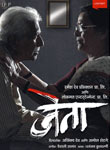 |
Rating: na
Producers: Ramesh Deo Production (P) Ltd. & Lokmat Entertainment Director: Ajinkya Deo, Amol Shetge Story-Screenplay: Ajinkya Deo, Amol Shetge | Music: Vaishali Samant Lyrics: Vaibhav Joshi Camera: Dhananjay Kulkarni Cast: Ramesh Deo, Seema Deo, Ajinkya Deo, Manava Naik, Aniket Kelkar, Hemangi Mahabaleshwarkar, Atharva Undale, Sandeep Mehta, Prasad Oak, Aditya Shah, Ranjeet Jog, Kaustubh Diwan, Sharad Ponkshe, Ravi Patwardhan, Sanjay Kshemkalyani, Janardan Parab, Atul Joshi Movie Review by: Ulhas Shirke |
Martin Luther King, Jr. once said: “Justice denied anywhere diminishes justice everywhere.” Based on the ideology behind such thoughtful utterances, Ramesh Deo Productions and Lokmat Entertainment Pvt. Ltd., have come up with a strong answer to an existing situation in the society, where justice is denied to a father, who is the only witness to his daughter’s murder. “If the hands of Law were strong enough, no one would dare to commit a crime, says Prof. Yashwant Rajadhyaksha, (played by Veteran actor Ramesh Deo) a retired professor of law, in the concluding part of the film. ‘Jeta’ has such a strong subject that is pushed with equally interesting screenplay supported by sensible dialogues to create awareness in the society. In short, it is a message to law makers.
The film opens up with an old couple Mr. & Ms. Rajadhyaksha (Ramesh Deo and Seema) remembering their daughter Shweta (Manava Naik) , who is murdered by three youngsters of influential parents. Very cleverly the director has used the lyrics of the song ‘Ya Sukhano Ya..’ reminding both about their longtime association. Shweta, who is making a documentary film on a village –Kalambi, (as part of her project in college)which is being redeveloped in the name of SEZ, by exploiting the rural poor. She gets a strong support from a protagonist Prabhakar Pannicker (Sharad Ponkshe) a leftist, and other villagers. The three youngsters later murder Shweta while attempting to collect the evidence against them and that too in the presence of her father, who puts up a brave fight.
The case is heard in the court of law and the three criminals get away with the crime, for want of sufficient evidence. Helpless Professor is then encouraged by his wife to take revenge and the professor takes his revenge in his own style, by killing two out of three killers using his well planned methodology. An ACP Vikrant Marathe( Ajinkya Deo) steps in to investigate the murders. This is where the screenplay takes a new twist. Prof. Rajadyaksha does succeed in his mission for the third time, but he gets the timely support from another person. And, this time, his beloved wife is present to watch that scene. The next day, the couple take leisurely walk at the sea shore, having completed their mission successfully. But, this time, the professor has a message, “Come forward and fight injustice, be a ‘Jeta’, yourself. Have courage to fight your own battle.”
The film has the touches of popular Bollywood film ‘Andhaa kanoon’ and recently released Marathi film ‘Second Inning’. However, looking at the efforts put in by director duo- Ajinkya Deo and Amol Shetge, it is certainly a good presentation to create that desired impact on the audience. Screenplay and dialogues match well with the main theme, which is ‘revenge’. Every important scene is well supported by suitable sound effects and background music. Lyrics by Vaibhav Joshi and music by Vaishali Samant also go well with the screenplay. Both have also tried a song on RD style in a Disco with the help of suitable light effects. Editing by Sarvesh Parab is satisfactory, as you don’t feel bored anytime during the film. Photography by Dhananjay Kulkarni is also impressive.
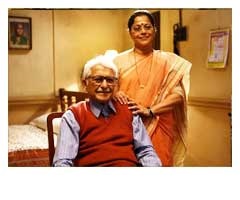
It was nice to watch the veteran couple together after a long time. And, both Ramesh Deo and Seema have performed well. Seema in particular was at her best in that sequence where she encounters ACP with battle of words. Even the interaction between Sharad Ponkshe and Ajinkya Deo during investigation process, extracts the best from these two talented artistes. Manava naik and other artistes in the film support well.
The film has successfully managed to present a theme, which is so relevant in today’s time, when some of the dreaded criminals are making a mockery of our system, finding the loopholes. Is it a right thing to kill such dreaded criminals in a fake encounter? And, the film has the answer. Hopefully, such a film with a sensational theme should receive a good response from Marathi film lovers.
‘Mission Possible’ Review
 |
Rating: 2.5
Presenter: Percept Picture Production: SSJ Films Story, Director: Pushkar Jog Screenplay:Shirish Latkar Music: Sai-Piyush Camera: Sanjay Khanzode Cast: Pushkar Jog, Manisha Kelkar, Saie Tamhankar, Niranjan Joshi, Astad Kale, Mohan Joshi, Sharad Pokshe, Ganesh Yadaw, Movie Review by: Sandeep Hattangadi |
Pushkar Jog- the youngest actor-director of Marathi film industry, who has already proved his ability with ‘Satya’ , now goes a notch ahead with the musical thriller ‘Mission Possible’ which is written and directed by him besides acting.
The story of the film begins with events like dance competitions, turf fights, rose days, drugs and rock-n-roll, leaked exam papers, canteen blues and endless coffee sessions of college campus. Yash Kirtikar (Pushkar Jog ) is an enthusiastic collegian who has a dream girl in his mind, but does not reciprocate the girl Saie (Saie Tamhankar), who really loves him. He has his group of friends funnily named Neil, Nitin, and Mukesh (nothing to do with the actors and singers of Bollywood). Tragedy strikes when Yash and Saie open the lid on a drug and exam paper leak syndicate running in the college. Further, Yash, who is really in love with a girl Pearl (his dream girl-Manisha Kelkar) is implicated in her murder during a dance competition and is sentenced to a jail term.
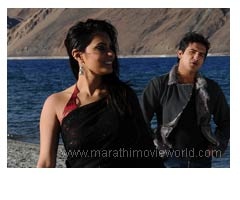
Yash with the help of a ‘Bhai’ (Ganesh Yadav) escapes from the prison and with the help of his friends, tries to reach the real killer.
The story and screenplay of Shirish Latkar does remind us of many Bollywood films in the past with similar sub plots. But, Pushkar does a wonderful job as an actor and director and also goes on to prove that he is a fantastic dancer. He has succeeded in giving enough scope to his young team of actors like Niranjan Namjoshi, Sai Tamhankar, Manisha Kelkar, Shantanu Moghe, Astad Kale, and Amrit. The dance sequences are slickly shot in snazzy music video style. The romantic song shot on the locales of Ladakh is comparable with any good Bollywood film picturisation.
The music and background music by Sai-Piyush is in tune with the youthful vibrancy of the film. The cinematography by Sanjay Khanzode is top-class especially in the musical and chase sequences. The film moves at a fast pace, required for a murder mystery and the editor does a good job. The senior actors like Mohan Joshi, Sharad Ponkshe,Ganesh Yadav, support well.
Basically it is a film by the youth and for the youth.
The highlight of the film is its slick presentation and style, a new benchmark in Marathi cinema.
Monsoon ‘Haapus’ tastes Sweet and Sour
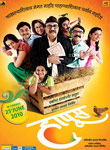 |
Rating: na
Presenter: Eros Entertainment, Everest Entertainment Producers: Sanjay Chhabria, Abheejit Satam Director: Abhijeet Satam Camera: Rahul Jadhav Story & Screenplay: Saurabh bhave & Subodh Khanolkar Lyrics: Sandeep Khare Music: Dr. Salili Kulkarni Cast: Shivaji Satam, Madhura Velankar, Makarand Anaspure, Subodh Bhave, Pushkar Shotri Movie Review by: Ulhas Shirke |
Finally, Sanjay Chhabria and Abhijit Satam’s much awaited ‘Haapus’ has arrived in Maharashtra on the day with wet spell of monsoon spread all over the state. But, the aggressive monsoon decided to take rest, at least in the city of Mumbai; so that people could come out and welcome the king of Konkan, in whose honour the film has been made.
‘Haapus’ which truly stands to its name, does sincerely speak about the exploitation of the poor mango growers from Konkan over the years by the money minded traders. But, keeping in mind the commercial success of the film, the film adds few sub plots to create that required humour and apprehension in the screenplay. The film is mainly filled with emotions of different characters and their reactions to every situation.
Anna Gurav (Shivaji Satam) the head of the family of one of the mango growers of a village in Konkan, is also a victim of this exploitation. He has no regrets, but tries to hide a past happening from his children. Like many others, happy with the price they get for their crop every year; he too is a contented person. One day Anna’s own son Ajit (Subodh Bhave) , who does his own research to grow a better crop, turns protagonist and decides to sell the product directly into market, without involving a middle man. He tries to persuade other crop growers, but the shrewd trader Chajed (Vidyadhar Joshi) blocks his plans, by playing the divide and rule policy. In the meanwhile, a school master from Marathwada – Digamber Kale( Makarand Anaspure) walks into the village on his new assignment and finds temporary shelter in Gurav’s house. He comes to the rescue of Ajit and the entire family of Gurav, including the auto rickshaw driver Subhya (Pushkar Shroti) who is in love with one of the twin daughters of Anna, support him in his mission against the trader.
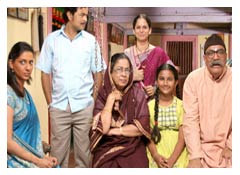
Director Abhijit Satam, who makes his debut as a director through this film, has handled the plot with sincerity, trying his best to show how difficult it is to break the traditional middle man business. With ‘United we stand’ policy of the family he shows sensible audience the way of direct marketing. ‘Haapus’ does take the help of humour with the director taking the advantage of the double role of Amruta-Ankita (played by Madhura, his wife) and offering some comedy scenes in ‘Seeta aur Geeta’ style. In fact, he concentrates on the main plot post interval, after entertaining the audience with a social family gathering.
Good thing about ‘Haapus’ is that there is no vulgarity in the screenplay as the film limits every character within a framework, not allowing anyone to overact or over react and offering enough space to one and all. Only unrealistic and predictable part in the film is the hospital scene in the climax, which has been influenced by some recent Bollywood films. In fact, every happening that takes place in the hospital, looks unnatural. Watch, when Pushkar Shroti walks into the hospital to inquire about Grandma’s health. It only creates laughter for no reason, among audience. But, the superb performances by all the artistes and the pace with which the screenplay moves, does help to surpass such scenes. Sunil Barve and Milind Pathak make special appearances at the right places to offer help to Gurav family during their time of crisis.
The picturesque Konkan has been shot well by Rahul Jadhav with his expert camera work. The director has also been more careful for the indoor scenes, to make them more realistic and hence has chosen the real locations in Kudal. The scenes of actual market place in Vashi have been captured well. Music of the film is just fine, with the title song more impressive than other two songs.
Shivaji Satam has given his best performance through this film in that tailor made role of Anna Gurav. Both Subodh Bhave and Makarand Anaspure are perfect choice in their respective roles. Madhura Velankar gets a chance to prove her ability as an actress offering variety. Sulbha Deshpande looks a perfect Grandma and gets due recognition. Mansi Maggikar (Anna Gurav’s wife) and Mrunal Deshpand e (Ajit’s wife) do not have much to their share, but they have done well. Swarsha Jadhav as the youngest member of Gurav family is good; but it is Pushkar Shroti, who outshines other co stars. Except for Shivaji Satam, there isn’t anyone else in the film, who could compete with him for using that typical Konkani dialect throughout the film. Prashant Damle, plays the Narrator with his voice over, to explain the situation at the beginning and end . In all, ‘Haapus’ is a package of straightforward family entertainer.
‘Mumbai-Pune-Mumbai’ in 106 minutes
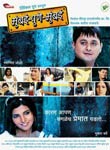 |
Rating: na
Producer: Mirah Entertainment Pvt. Ltd. Presentor: Twinkle Group Exe. Producer: Sanjay Dawra Director: Satish Rajwade Story, Screenplay: Parag Kulkarni, Satish Rajwade Camera: Suhas Gujrathi Editing: Rajesh Rao Cast: Swapnil Joshi, Mukta Barve Movie Review by: Ulhas Shirke |
A young modern girl dressed in Long Red skirt and white top (Let us call her Ms. Mumbai) moves all alone from Mumbai to Pune just to select her would be, on the request of her Mother. After passing from one junction to other searching for the address, she finally lands at the destination point, where some boys are playing gully cricket. She selects none other than the batsman (Let us call him Mr. Pune) to know exact location of the house; and as a result of which he is clean bowled. The young man (Dressed in Bermuda shorts, an overcoat and sports shoes) however directs her to the location but to her surprise, the door is locked. Ms. Mumbai is unable to contact the concerned person, as her cell phone battery is down. So, she proceeds to a grocery shop, only to call her friend and inform about the non availability of the person. Here again, Ms. Mumbai and Mr. Pune meet for the second time.
Their general argument to show each other’s attachment for their native, brings them together, when Mr. Pune offers courtesy to Ms. Mumbai by taking her for a ride during the day time, as the girl has a return ticket for an evening train and wants to pass her time. Together, they visit places like Saras Baug, Dagduseth Ganapati temple, crowded Tulshi baug and Sinhagad. They share their experiences about their past love affairs, but do not reveal each others name. Finally, Mr. Pune drops Ms. Mumbai at Pune station and both say good bye to each other. While she waits for her train, she receives a call on her cell phone, (which suddenly starts functioning) from the boy from Pune, whom she had actually come to see. But, when she comes out to meet him at the gate, as agreed, she finds Mr. Pune, still struggling to kick his scooter. Needless to say that Mr. Pune is none other than her would be. In the climax shot the girl is shown running to catch her train back to Mumbai, giving some indication to the boy about her approval.
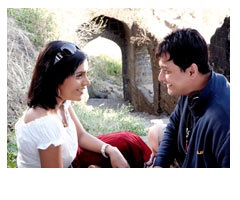
Director Satish Rajwade directs this unusual love story in his own style trying to keep the audience engaged with arguments and counter arguments between the two characters. Mumbai-Pune-Mumbai, is more like an audio delight ( through timely dialogues) than visual impact, as you only notice the two characters in the same dress for about 100 minutes, except for the song-cum-dream sequence for 5 minutes, when they are seen in some designer costumes. It is only few outdoor locations of Pune darshan that brings in some change, but otherwise you see two of them just perform and express their emotions, while making their point. There isn’t much scope for music, but other technical areas have been handled well.
Mumbai-Pune-Mumbai(MPM), is thus an experiment to attempt something different. Such experiments are only acceptable in Marathi cinema. Precisely, MPM is a performance driven and communication based film with both Swapnil Joshi and Mukta Barve coming out with realistic performances. Except for few junior artistes, there are no other characters in the film. Targeted mainly at the young audience from Mumbai and Pune, the film does succeed in inviting the attention of elders besides the youngsters. But, this movie is certainly not for school going kids, as they are sure to feel sleepy or become restless during that total 106 minutes journey. For others, it is a light entertainer, for a change.
